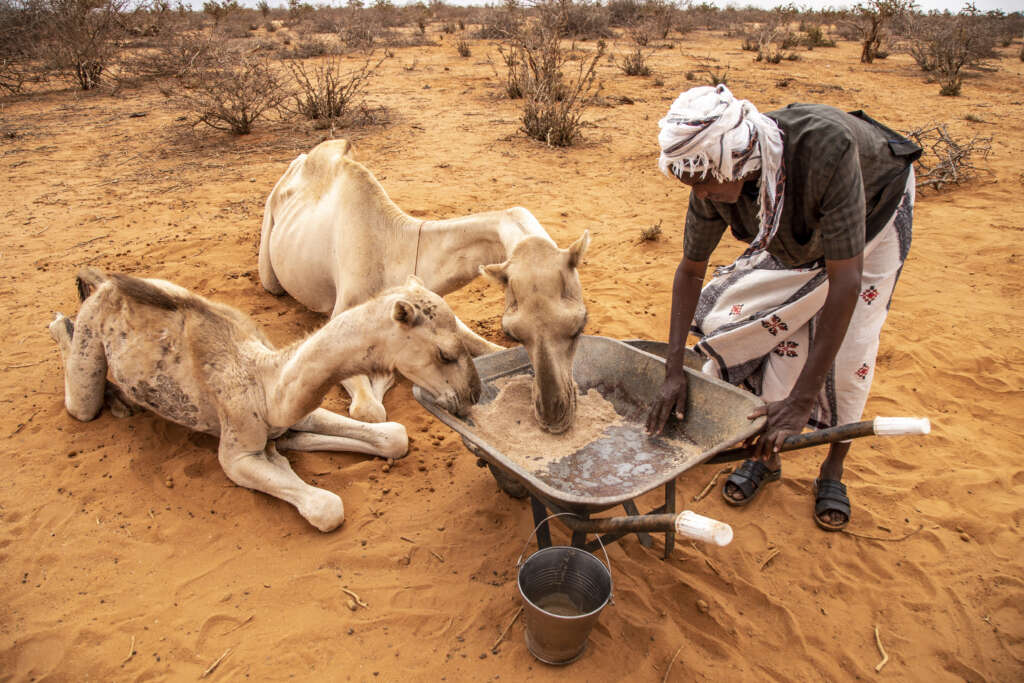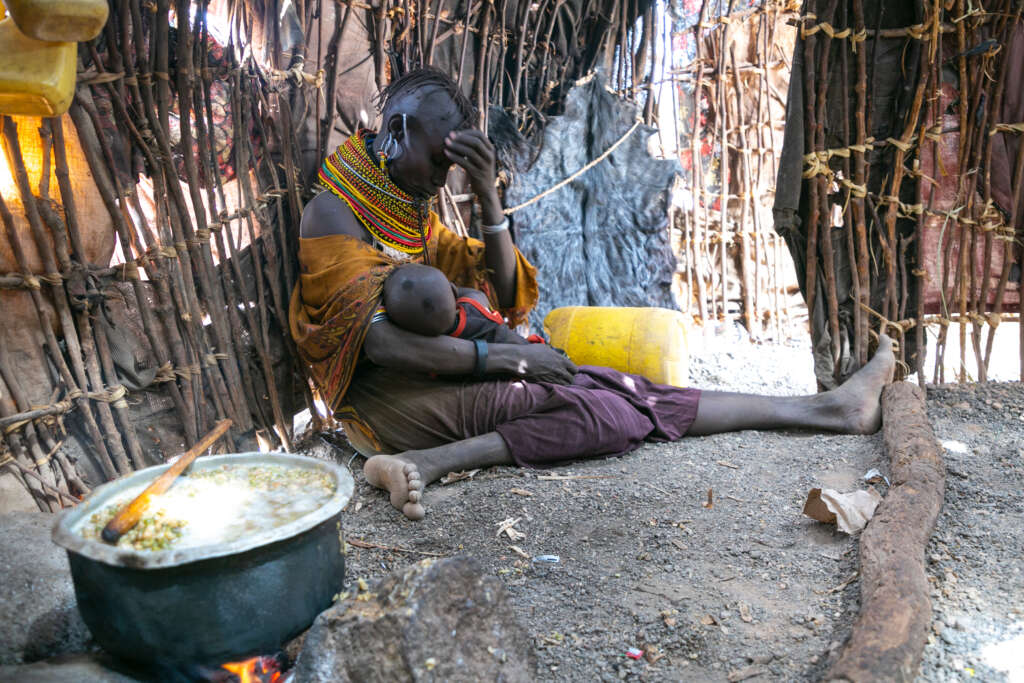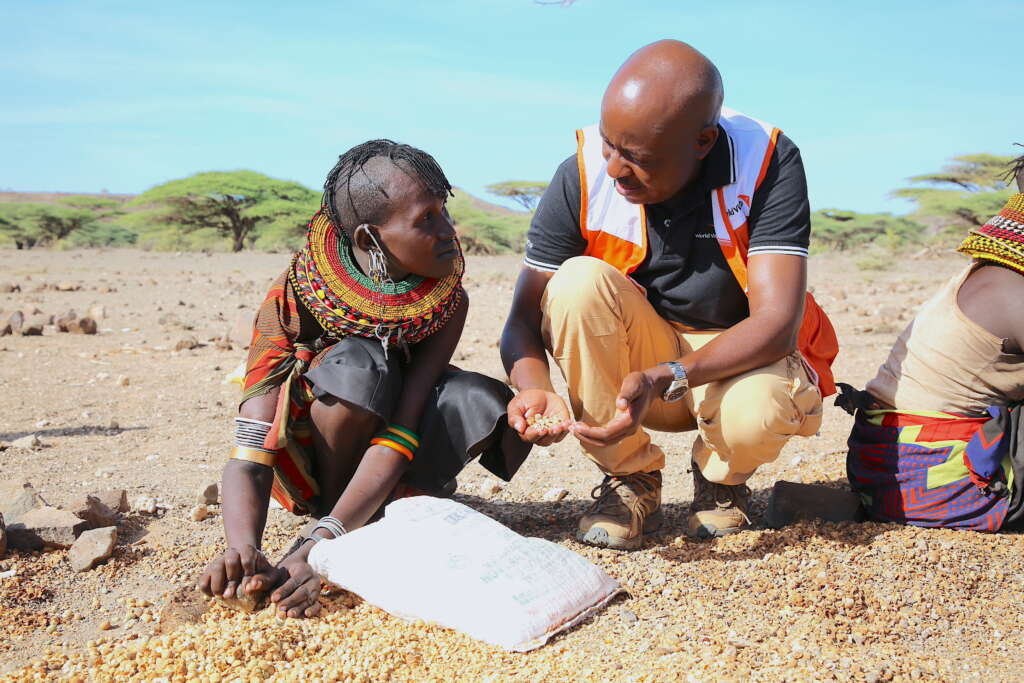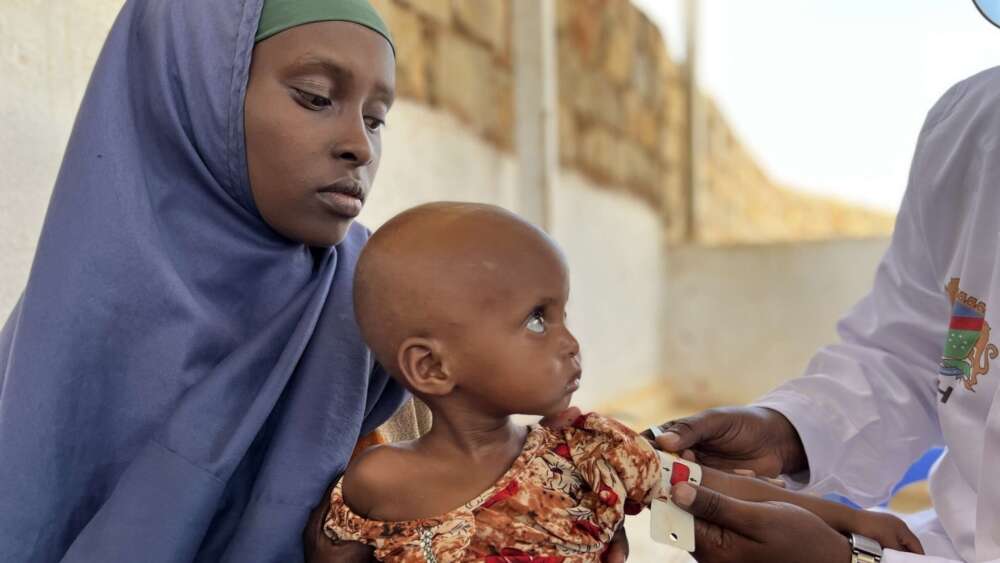Amazing generosity amid heartbreaking choices
Crushing stories of East Africa’s drought
My heart aches when Joseph Kamara tells me of a family he recently visited in northern Kenya who were preparing their 14-year-old daughter for marriage, in defiance of her wishes to go to school and study so that she could become a nurse.
And yet, asks Joseph – World Vision’s East Africa Regional Director for Humanitarian and Emergency Affairs – what alternative is there?
This household had been wealthy by local community standards, but because of the prolonged drought and four failed crop seasons, they had lost all but seven of their 300 heads of livestock. And their children were starving.
“The sad part was the father was suffering from depression from losing everything. He couldn’t live in the house. He was staying in the bush because he can’t live with people anymore,” he said.
“But part of the challenge they had was that one of his daughters, about 14 years old, was being prepared for marriage. The child wanted to go to school, she wanted to study, she wanted to be a nurse, but she was seeing her dreams slipping away.”
“What would you do if you have four children in the house and the younger ones are at risk of dying …?”
Normally, at the beginning of each term or semester, the family would sell off livestock to pay for school fees, but now there was no money. Secondly, this family had three other children.
“So when we heard that, we said, ‘No, you can’t do that.’ You put on a humanitarian hat and she has rights. Then the man asked, ‘Okay, be me for a second. What would you do if you have four children in the house and the younger ones are at risk of dying and you have an older one who can be married? One, you have one less mouth to feed, and two, you’ll get some money out of her marriage, the bride price. And save others. Can you tell me, if you are me, what would you do? Can you give me a solution now?’”
As a father himself, Joseph realised with a heavy heart that he probably would have done exactly the same thing rather than watch all of his children die.
“The mother in the house was waking up at night every other hour. She would sleep and wake up to feel the pulse of the youngest child to see whether the child is still alive. That’s how bad that it was. So how do you respond to that kind of crisis as a parent? What do you do? And I imagined this could be my own children.”
While World Vision promised to find ways to get food to this family, Joseph knows that there are millions of others they don’t know about who they haven’t reached. “And the others we do hear about, we don’t have enough resources to support everyone affected.”
“We’ve had this crisis now for over a year. It just keeps getting worse.” – Joseph Kamara, World Vision East Africa
This was just one of the stories that brought World Vision staff to tears in Australia last week during Joseph’s visit to Melbourne for meetings with government departments and supporters.
As usual, his campaign to lift awareness of the devastating drought in East Africa was derailed by a bigger news story – the death of the Queen.
I remark how events like that get all the attention and an ongoing crisis like the one in East Africa gets pushed to the sidelines. “Do you know how we can break through that wall and get people to respond?” I ask him.
“It is challenging. We’ve had this crisis now for over a year. It just keeps getting worse. It started when we had floods across the plains of East Africa towards the end of 2019, then we had desert locusts and we knew this was going to really be bad. Then COVID hit and we had four episodes of back-to-back drought. And each time we tried to raise this issue, we were knocked off the headlines by something else.
“Of course, COVID-19 sucked all the airtime, but in as much as it was also affecting us and aggravating the situation, nobody was paying attention. And now when the situation worsened earlier on in the year, the Russia-Ukraine crisis came and got all the attention. It’s as if, when you’re about to gain momentum, when you’re about to get people to organise this, something else comes up and now it’s the Queen passing. So it’s like one issue after the other, making it very difficult for us to get headway in informing the people.”
38 million people are suffering food insecurity.
I ask Joseph if he has a positive story to tell about this crisis where 38 million people are suffering food insecurity. He told me about the amazing generosity he had experienced in another community he visited in Northern Kenya that had been ravaged by back-to-back droughts.
“They had lost it all. They had lost everything. So as I went to different homes, on the way there, you could see carcasses of livestock and wildlife,” he says.
“And by the time you see wildlife dying, if elephants, zebras, buffalos die, then you know that the crisis is bad because that wildlife knows how to adapt. They’re more resilient than livestock. They know how to track long distances, where they can find water, but probably they have died at the last waterhole that they could remember.”

Abdullahi Arab in Doolow, southern Somalia, is desperately trying to keep his few remaining livestock alive but there is no pasture in sight. He can barely afford the folder at $US10 for 50kg and he cannot sell his camels as no one will buy them in their poor condition.
During this visit, a chief of the community, a pastoralist who had lost more than 300 heads of livestock and had just five remaining, talked about the challenges he faced and his hopes for survival.
“As he showed us around, we worked with him to collect the bones of the carcasses that were remaining so that they can clear the ground, hoping that maybe at one time, the rain will come and fresh grass will come up,” he says.
After a few hours of talking with this chief, Joseph began to get hungry and wasn’t sure how he would cope because the nearest town was 60km away.
“But I didn’t say anything. I kept quiet. And then he said, ‘You can’t leave without coming to my homestead.’ So we went to these homesteads and sat on stools. And then all of a sudden they bring food. They said, ‘We would like you to share a meal with us.’ And we were shocked, saying, ‘What are we going to share? I mean, you have lost everything. You just told us there’s no food, and we can see the children are malnourished.’ This man had slaughtered a goat for us! We tried to protest, but our local staff said, ‘You can’t refuse, they’ve honoured you. He’s giving his last in a quite vulnerable way to demonstrate his generosity, to demonstrate his humanness.”
“This is what godliness is about. It’s not about sharing in times of plenty. It’s about sharing what you value and treasure.”
Joseph was greatly touched by this incredible act of sharing in scarcity, which he says is how such communities survive.
“Any support they get, whether it’s a food pack or whether it is cash, they have to share it among themselves,” he says.
“For example, when our staff select the most vulnerable, those who have lost it all, or maybe those who are elderly, and you give them food to last a week, it won’t, because everybody in the village will share that food.
“We may have sufficient resources, but it’s not easy to share. Yet in these poor communities, it is the opposite. Someone who is dying would still share what they have. And that’s something for us to learn from them, especially those of us who believe in God. This is what godliness is about. It’s not about sharing in times of plenty. It’s about sharing what you value and treasure. It’s not about giving change. It’s about giving all, like the woman in the Bible who went to the temple and gave two small coins … The Pharisees would come and give gifts and Jesus said, ‘She’s given more than these guys because she’s given everything she had.’ That’s how we felt in that community.”

Metir prepares “Edung, wild fruits” for her 11-month-old baby, Ing’olol. On her wall hangs an assortment of gourds that are a sad reminder of a time when her family had enough milk for food. Instead of cows, she has lots of skins from the animals she once owned. “My prayer is for God to bring rain because my most treasured possession are my children.” Metir’s husband has been away for six months looking for food for the family.
With the prospect of a fifth crop failure next June as the new La Nina hits, Joseph said the famine would extend to Somalia next year, leading to the death of about 500,000 children. Already, in countries such as Kenya, World Vision has witnessed mothers walking for days with their children to find food and water, and many burying their children on the way or soon after their arrival at a World Vision food centre.
I ask Joseph what’s the best way for Australians to help. He says peanut paste sachets can restore a child from the brink of death to normal health within two weeks. “So something like the equivalent of 10 Australian dollars saves that child from dying. You see malnourished children come and you give them this sachet to suck. It’s sweet and they suck it slowly. You give the mothers some of those sachets to take home, and they give it to the child anytime the child is hungry and they recover in two weeks. The child is smiling – the smile is back. Surely Australia can afford something like that.
“We don’t have money for everyone, so we’re taking food from the hungry to feed the dying. That’s where we are at.”
“It won’t put food on the table now, but it’s a solution that solves the problem in the long run.”
World Vision’s other urgent priority is drilling boreholes for groundwater.
“It’s not easy when people are facing a crisis and need food, so we prioritise food, but the next we prioritise is water because they go in tandem. And when you have access to water, then they don’t have to move.”

East African Humanitarian and Emergency Affairs Director Joseph Kamara chats with Lokale, who tells him the nearest water point is six hours’ walk away. School children have been hard hit by migration and inadequate education along with negative coping mechanisms like cattle rustling and early marriages of girls. World Vision is doing cash transfers to the most vulnerable households to help them face the brunt of the drought.
Finally, World Vision is teaching farmer-managed natural regeneration – the technique pioneered by Australian Tony Rinaudo – to help these pastoralist economies become more resilient in the long term.
“If you leave the ground to fallow, the roots stumps of the vegetation that was cut, especially traditional indigenous plants, would sprout up again. And we are trying to teach farmers on their small pieces of land how to identify what is an indigenous tree, and when it sprouts, how you can trim it and sustainably plant crops with it,” he says.
“And we notice that where we have those indigenous trees, production goes higher because the roots fix the nitrogen in the ground. And on top of that, if you have many of those trees, the climate gets balanced again. We have piloted this in different places.
“It’s really cheap, not expensive, but if we can do it en masse, we can reduce the impacts of climate change in the region. It won’t put food on the table now, but it’s a solution that solves the problem in the long run.”
“If it wasn’t for God, for people praying for me, my faith, leaning on Christ, it would be too difficult for me.”
I ask Joseph what keeps him going when the situation is so bleak. Where does he turn for strength?
“Well, as for me, if it wasn’t for my faith, I probably wouldn’t even be working in this job because it’s too heartbreaking. My heart gets broken every day.
“Remember Roméo Dallaire, the Canadian general who was leading peacekeeper after the genocide in Rwanda? When he left, he became emotionally sick. He became depressed. He struggled because of what he had seen. Sometimes I feel like that emotionally, completely every day, crying with mothers. Every day. What do you think? A mother who’s losing a child. You say, ‘sorry’ and walk away?
“No, I’m a parent, I can’t. I get emotional. So if it wasn’t for God, for people praying for me, my faith, leaning on Christ, it would be too difficult for me. And I keep encouraging myself like the man on the seaside, picking up starfish and throwing them in the sea, knowing he can’t finish the job, but he’s saving this one. I’ll be happy even if I save one or two or three. It’s enough because at least I’ve done my job, what God had called me to do.”
Please donate if you can to World Vision’s child hunger appeal here.
Email This Story
Why not send this to a friend?


